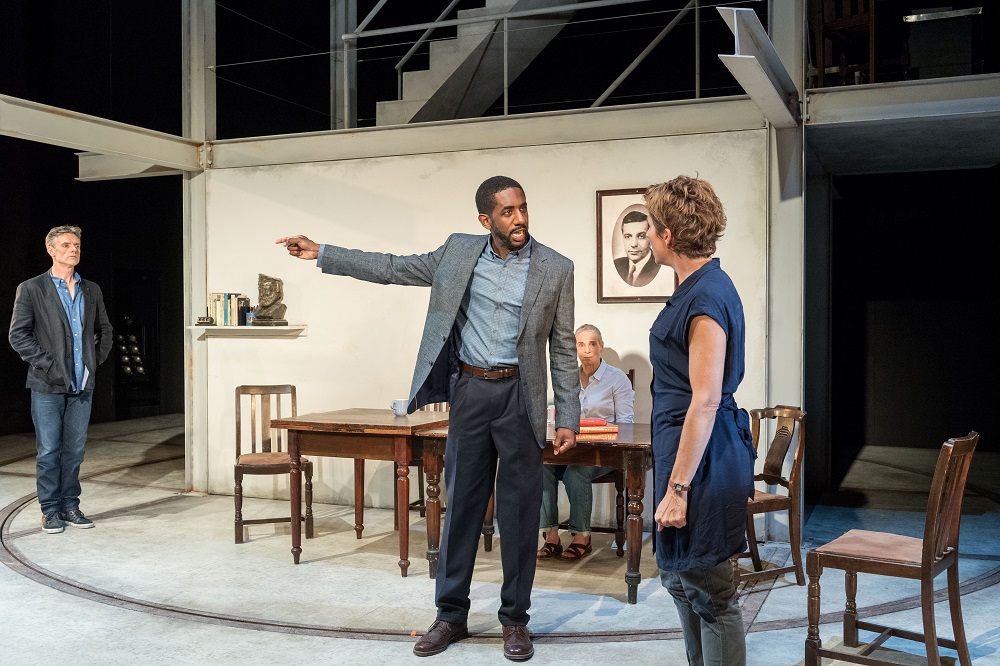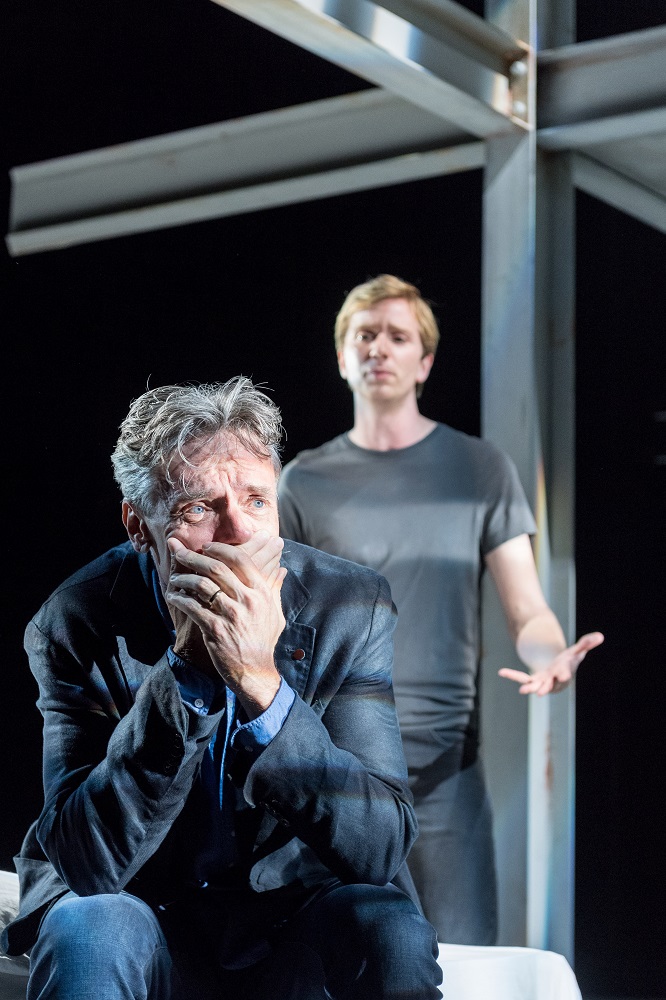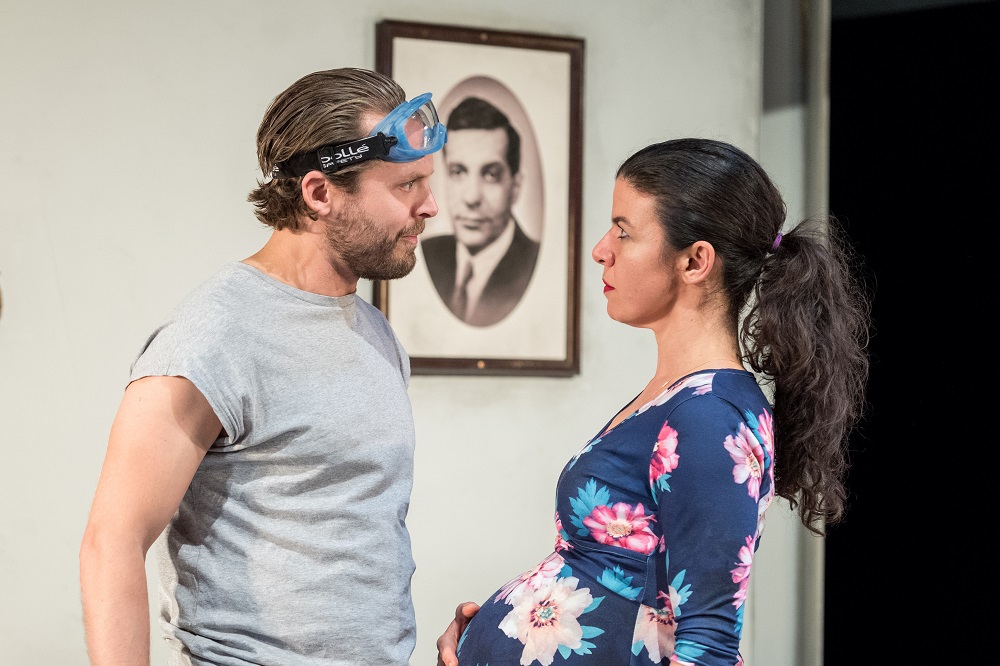So many words, starting with the title - we're told we can call it iHo - and so many lines spoken by anything up to nine characters at once. But as this is the unique world of Tony Kushner, it's all matter from the heart, balancing big ideas and complex characters and leading them beyond the realms of any safe and simply effective new play, in this case towards a father-and-daughter scene as great as anything you'll see in the theatre today.
This is a different sort of epic style to the freewheeling mastery of Angels in America. It's unusual to find a Kushner play where you can nominally describe the subject matter so easily, or define the timespan so clearly. It's 2007. A Brooklyn patriarch finds the ideals of his communism as a fighter for his fellow longshoremen and others washed up in retirement. Despite continuing curiosity and self-education - he loves Latin and is translating Horace - he attempted suicide a year ago and intends to try again, leaving his already troubled three children at a loss to know what to do. On one level this is a snapshot of an Italian American family defined by immigrant radicalism (a fascinating article in the programme by Marcella Bencievenni fills in the background). But are we going to believe that of the impressive cast assembled by director Michael Boyd? (Pictured below: Richard Clothier, Rhashan Stone, Sara Kestelman and Tamsin Greig).
No chance, really, beyond the talking-over and the accents, some of which come and go. This is more family of man. Both Kushner's writing and the production, set in the bleached white skeleton of a brownstone building - design by Tom Piper impressively lit as ever by Wolfgang Goebbel - with only a few crucial props like the bust of Garibaldi and the portrait of cousin and real-life workers' hero, congressman Vito Marcantonio, allow for the bigger frame of reference without the diversity splurging too much.
In the same way homosexuality is less central than sexuality in general and its relation to ideas and ideals, as worked through two of the three children. Pill (Pierluigi, the least Italianate of the lot albeit in a fine-tuned performance by Richard Clothier) is a consumerist to the extent that he's spent his sister's money on a fascinating rent boy, Eli (Luke Newberry; the two pictured below), despite a 26-year-old marriage to the (rightly) angry Paul (Rhashan Stone) he can't and won't dissolve.
 In a crucial scene with father Gus (David Calder), Pill touches on the relationship between sex and capitalism and the way old Marxists find it so much harder to accept gays than the socialists have (uncomfortable resonances here with the Corbynistas).
In a crucial scene with father Gus (David Calder), Pill touches on the relationship between sex and capitalism and the way old Marxists find it so much harder to accept gays than the socialists have (uncomfortable resonances here with the Corbynistas).
Empty (Maria Teresa, Tamsin Greig, full to overflowing), a labour lawyer, left a sterile marriage to Adam (Daniel Flynn) for motormouth Maeve (Sirine Saba). Empty and Adam still sleep together; Maeve once did so with Pill's and Empty's brother V (Vito, Lex Shrapnel, pictured below with Saba) though officially he's only a sperm donor for the child that's soon to be born to the two women. V turned his back on his father's activism, or rather Gus shut his third son out, and pursues the normal family life though he's exploding with anger.
Cue a big family bust-up at the centre of the play which behaves not so much like Arthur Miller, a model Kushner is happy to evoke, more like a contrived Ayckbourn climax on steroids. Though delivered with energetic virtuosity, it didn't quite strike the highest note of bittersweet hysteria in its audience, though the departure of Sara Kestelman's listener Clio, Gus's sister, with BVM picture and rolled up bedding is a delicious touch. You start by sympathising with this quiet former nun and onetime Shining Path follower in Peru - Kestelman gets the biggest laughs with the softest-spoken put-downs and responses - but eventually share Empty's ambivalent response to her maddening aunt.

Still, Clio has the right observations on a family in such pain, and nails the main theme of the play - which would make for a shorter title - namely Dogma versus Death. Of course with Kushner it's not as pat as that, and in the second of the three crucial father-children confrontations that give the last act its focus and its mastery, Gus reveals to the son in whom he's least confided, V, the exact circumstances of how his lifelong belief in unity finally shattered, based on a real-life union deal back in 1973.
Calder, inevitably, carries the weight of the play on his shoulders in a magnificent feat of memory and charisma. If at times the accent falters and we're occasionally aware of watching a consummate British rather than an Italo-American actor, the vocal range and depth of despair are unerringly negotiated. In this most operatic of plays, moving from crucial duets to dazzling octets and nonets, Empty ends up playing Brünnhilde as the voice of conscience to Gus's Wotan. We even get his longing for the end, his attempt to communicate to his daughter justified fear and despair of the world as it is right now (2016, that is). This climactic scene is framed by a chilling sequence not without its black humour in which the wife of a destroyed worker, an astute last-minute cameo from Katy Stephens, lays out the process of how the contents of the bag she brings will end Gus's life, and by a surprise last appearance by Eli which brings the promise of grace.
That's the final icing on the emotional cake, but it's the interplay between Calder and Greig, who's believable at every moment and never afraid to speak quietly to draw us in, which scours the soul. Stay with it, as my grumpy neighbours unfortunately didn't beyond the second interval, and you'll be rewarded with a one-to-one of which Shakespeare might have been proud. All this, and a National Theatre revival of Angels in America imminent: rich times for Kushner, and for us.















Add comment